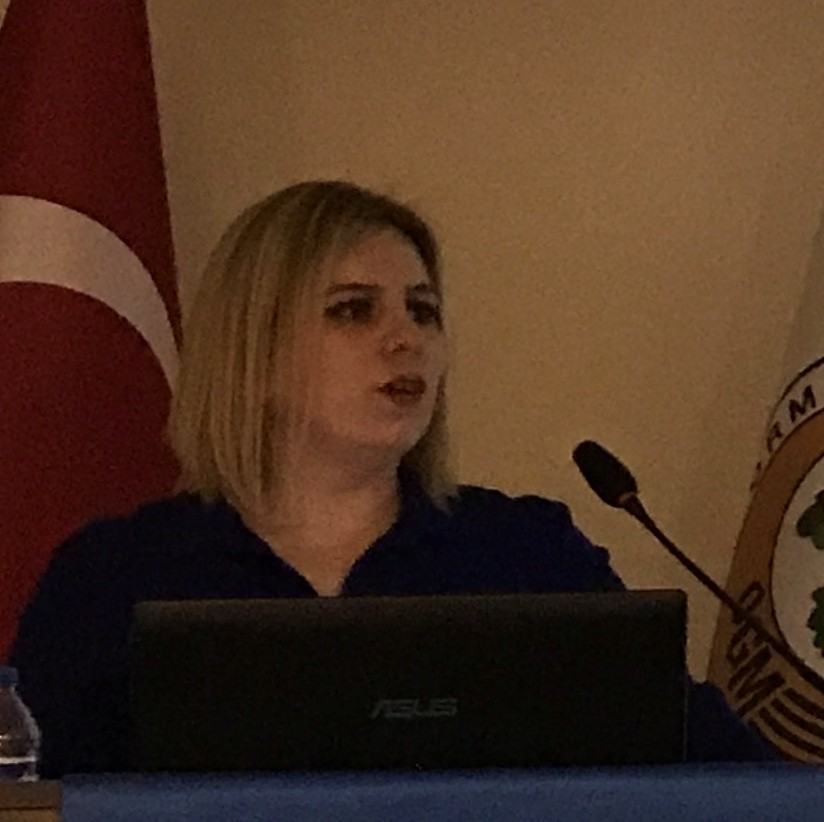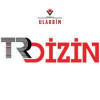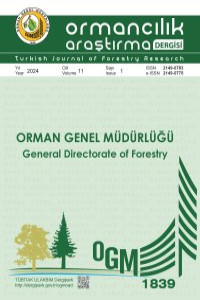Research Article
Aim & Scope
General Directorate of Forestry Journal of Forestry Research is an official journal of General Directorate of Forestry and aims to provide and share information on forest-related issues on national and international level.
General Directorate of Forestry Journal of Forestry Research aims to publish articles prioritizing research based papers on high scientific standard, and to put them into service by carrying out up-to-date studies on forest-related issues.
Journal of Forestry Research (OGMOAD) started to be published in 2014 with the aim of gathering the research results published as technical bulletin, annual bulletin, technical report, periodical and journal under a single roof in the charge of Forestry Research Institutes since 1952, and it consists of articles on interim or final reports of research projects take part in the work plan of Forestry Research Institutes and forestry related articles of academicians, researchers or practitioners which were not partially or completely published elsewhere before.
General Directorate of Forestry Journal of Forestry Research accepts articles from the fields below that involve basic and applied studies on national and international level in order to offer solutions for problems on forestry issues.
REHABILITATION | Seed, Tree Breeding, Genetics, Biotechnology. |
CULTIVATION | Silviculture, Botanic, Phytosociology, Afforestation and Plant Physiology, Landscape. |
ECOLOGY | Soil and Ecology, Watershed Management, Forest - Water Relations. |
MANAGEMENT | Economy, Yield, Management, Forestry Politics, Social Forestry, Forest Construction and Transport. |
CONSERVATION | Forest Fires, Entomology, Phytopathology, Wildlife and Protected Areas. |
FOREST PRODUCTS | Wood and Non-Wood Forest Products, Forest Products Industry. |
Author Guidelines
Click for the article writing template.
Ethical Principles and Publication Policy
Ethical Principles and Rules, and Publication Policy of the Journal
Turkish Journal of Forestry Research of The Directorate General of Forestry (DGF) publishes qualified scientific articles on forestry succeeded the referee and editor processes, in electronic and printed forms in accordance with ethical principles and rules, with free access.
Publication ethics and open access policy of the Journal were prepared according to the ‘Editorial Ethics Committee’s (COPE, publicationethics.org) directive. During publishing process, all components, including publishers, editors, authors and referees comply with the ethical principles in accordance with the Editorial Ethics Committee (COPE) guidelines and policies (Code of Conduct, and Best Practice Guides for Journal Editors).
Ethical responsibilities and duties of the authors, Journal’s editors, referees and publishers are given below.
Publisher's Ethical Responsibilities
The Turkish Journal of Forestry Research is not for profit, and as the publisher DG Forestry meet the public interest.
• DGF acknowledges the Editor in Chief (and responsible managing director) as decision-maker and refereeing for the article publishing process is his/her responsibility.
• DGF provides open and free electronic publication and access of the Journal in web pages.
• Editorial independence principle is essential for relations between the Editors and publisher (DGF), and all editorial decisions are independent from publisher and owner of the Journal.
• DGF is committed to creation of independent editorial decisions.
• DGF protects the property and copyright of every article published in The Turkish Journal of Forestry Research, and undertakes to keep their published hard and electronic copies.
• DGF is responsible for taking abusive, citation and plagiarism-related measures related to the Editors.
Editor in Chief
• is responsible for all articles published in the Journal.
• strives for increasing and improving the quality of the Journal.
• supports the authors' freedom of expression.
• ensures that sections (letter to the editör and invited articles) of the Journal do not require referee evaluation are clearly stated.
• makes efforts to ensure that articles published in the Journal are compatible with the knowledge and skills of their readers.
Responsibilities of the Editorial Board
The Board consists of the Editor in Chief, (Vice editor), Turkish and English language editors and Subject matter editors, and Editor in Chief is the chair. Experts for the Forestry Research Institutes under DGF, or university faculty members could be assigned as Subject matter editors by the Editor in Chief according to Journal’s departments and each article’s main subject.
Journal’s all Editors must comply with the following ethical responsibilities in COPE Best Practice Guidelines for Journal Editors (publicationethics.org/files/u2/Best_Practice.pdf) and COPE Code of Conduct (publicationethics.org/files/ Code_of_conduct_for_journal_editors_Mar11.pdf) published by the Committee on Publication Ethics (COPE).
• The Board is responsible for each article including its after printing, and makes its decisions about the Journal independently considering the public interest, and its relationship with the publisher, other people and organizations is based on the principle of independence.
• The Board tries continuously to improve the Journal and increase its quality.
• Determines publication, blind review, evaluation process and ethical principles of the Journal and ensures its implementation.
• Protects the copyright of article authors published in the Journal.
• is responsible for taking measures related to intellectual property rights, non-scientific and non-ethical behaviors, plagiarism and citation mobility in the article and the Journal publishing process.
• prepares “The Author Guide” for authors, and “The Evaluation Guide” for referees, and updates them as needed.
• stores records of each article and correspondence related to Journal electronically or in print.
Editor in Chief’s Relations with the Board
• ensures that Board members proceed the processes in accordance with Journal policies and guidelines; inform the members about the policies and developments, and should be in regular communication with them.
• ensures that Board members’ evaluating the articles sent to the Journal impartially and independently.
• conveys the most current publishing and writing rules to the members and explain what is expected of them.
• assigns experts as Board members to actively participate in developing the Journal, and evaluate each of one by whose own success.
• informs the members to support the Journal’s development, and writing reviews of their specialty, if requested.
• fulfills the necessary responsibilities in all processes related to the Journal’s operation.
• holds meetings with the Board at regular intervals to improve the editorial policies and the Journal.
Ethical Responsibilities of the Editor, Assistant Editor and Subject Matter Editors
• Editors strive to meet information requests of the referees, authors, researchers, practitioners and other readers and respond if necessary; and to act according to the principles of openness in matters requiring correction in the publishing process and issues requiring explanation.
• When deciding to publish article, editors should pay attention to be (preferably) original, to its contribution for scientific literature, readers, researchers and practitioners.
• When making a positive or negative decision about the article, Editors consider original value of the article, its contribution to forestry, validity and reliability of the study, clarity of the narrative and purpose and scope of the Journal.
• pre-evaluate the incoming article if there is no significant problem, consider positive referee suggestions, and do not change the previous editors' decisions unless there is a serious problem.
• ensure the article is evaluated independently and neutrally within its duration.
• send the article to the Subject Matter Editors and Referees taking into account their expertise, and support the independent and neutral evaluation.
• consider whether there is a conflict of interest/ unity between Subject Matter Editor, Referees and the author for unbiased evaluation of the article.
• block unscientific reviews that do not comply with academic etiquette.
• operate the Journal processes in accordance with the publishing policies and the guidelines, inform those involved in these processes about the developments on publishing policies and prepare a training program if necessary.
• communicate effectively with everyone involved in Journals processes and can hold meetings at regular intervals.
• ensure the protection of personal data in the evaluated article, as well as the personal data of the authors, the referees and readers.
• pay attention to the protection of human and animal rights in the article, care about documenting the explicit consent of the article’s participants, and reject the article without Ethics Committee approval of the article’s participants, or without written permission for experimental researches.
• Editor in Chef takes action against abuse of the duty, and makes an objective investigation and shares the findings on the subject, if there is any complaint in this direction.
• Editors provide correction of errors, inconsistencies or misdirections in the article.
• protect the intellectual property right of the published article, and defend the Journal and author rights if there is a violation. They also take necessary measures to prevent the content of the published article from violating the intellectual property rights of other publications; also make originality-similarity checks.
• take into account consistent criticism of the article published in the Journal, giving right to reply to the article’s authors.
• take into account the studies contain negative results.
• Editor in Chef reviews the complaints submitted to the Journal and make the necessary explanations.
• Editor in Chef carefully reviews the complaints of the authors, referees or reader, and respond them in an illuminating and explanatory manner.
Subject Matter Editors’ Relations with the Referees
• Subject Matter Editors ask the referees to evaluate the articles appropriate for their knowledge and expertise, and thus provide appropriate evaluation of the experts who receive the articles.
• ask referees to indicate there are no conflicts of his/her interest regarding the article before evaluating.
• convey to the referee all information regarding evaluation process and what is expected from him/her to do as a referee.
• ensure the peer review process is carried out with double-sided blind review, and should not disclose the referees to the authors, and the authors to the referees.
• evaluate the referees personally by him/her timing and performance.
• should update and expand the referee pool consistently, with a wide range of expertise and names; the pool should be updated according to the referees’ performances and need, and referees who make rude or unqualified comments and return late should be removed from the pool.
Editor in Chef's Relations with the Authors
• Editor-in-Chief updates the Journal’s publishing and writing rules, and sample template continuously.
• evaluates the incoming article in terms of Journal writing rules, and the study by its importance and originality. If refusing the article decided in its initial submission process, he/she conveys the reasons clearly and impartially to the author.
• As a result of the prior review made by the language editors, if it is decided that the article should be revised in terms of grammar, punctuation and spelling rules, the Editor-in-Chief informs the author and gives him/her enough time to make corrections
• The article should include the dates of submission and publication.
• If the author requests information regarding the status of his/her article, this information should be provided to whom in a way that does not disrupt the bilateral blind review process.
Ethical Responsibilities of the Referees
In the journal, articles are evaluated by double-sided blind referee where neither the author recognize the referees nor the referees recognize the author. Referees cannot communicate directly with the author. The article is sent to the referee through the Journal management system for his/her evaluation. The referee should fill in a Form for the article he evaluated by its contribution to forestry and for his/her decisions and reasons for whether the article is publishable or not.
Ethical responsibilities of the Referees who will evaluate the articles sent to Journal are:
• should only agree to referee articles on his/her field of expertise.
• must agree to be a referee in an article of no conflict of interest/ unity of himself/herself; if notices a conflict of interest/ unity, must notify the Editor in Chef and do not referee that article.
• make the Article Evaluation neutral, objective and confidential; destroy the article examined by him/her after the evaluation process, but could use it after it is published. Nationality, gender, religious belief, political view and commercial concerns should not disrupt the neutrality of his/her assessment.
• fill in the "Referee Evaluation Form" for the article he/ she is evaluating; must not indicate the names of the referees/ authors on the Form in order to avoid the double-sided blind review process being damaged; and also state his/her decision and justification as to whether the article he/ she has reviewed is publishable in this Form.
• make his/her assessment in accordance with academic etiquette and constructive language; his/her suggestions should be respectful and scientific, and must not make personal comments involving insults and hostility. If his/her offensive, disrespectful and subjective personal comments are determined, the Editor in Chef may contact him/her to revise and correct his/her these comments.
• the referee must complete his/her assessment of the accepted article in the time given to him/her.
Authors' Ethical Responsibilities
Ethical responsibilities of the author who applied for an article to DGF’s Turkish Journal of Forestry Research are:
• must not send an article published elsewhere or not sent for publication, and more articles to the Journal at the same time. It should be stated in the Petition of the article that "this article has not been sent to another journal", and must have a completed Assignment Certificate attached to it.
• Submit (preferably) an original article to the Turkish Journal of Forestry Research.
• should not write people as a writer without contributing to the article, and should not suggest changing, adding or removing authors of the article that who sent to the Journal.
• must write all the resources used in the article in accordance with ethical principles and with proper citation, and add them into References section.
• state and explain if there is a conflict of interest/ unity regarding the article, must notify those concerned to the Editors.
• should present the raw data of his/her article in the referee process to the Editor if necessary, and must keep the data of his published article for 5 years.
• must certify the data used in his/her Article have obtained the permission for use rights or research-analysis or the consents of the studied participants.
• contact to Editor in Chef to provide information, correction or withdrawal when he/ she notices an error regarding the article in the evaluation and early view phase or published electronically.
• must specify he/she has received Ethics Committee Approval for research requires data collection by quantitative or qualitative methods such as experiment, questionnaire, scale, interview, observation and focus group work which necessitate an Ethics Committee Decision (with the name of the ethics committee, the date and number of the decision of the ethics committee) on the first/ last page of the article and in the method section; upload the ethics committee document to the system with the article application. In the case reports, the author should give the information about the fact that he/she received the informed Consent Form in the article.
• present the evidence that he/ she is "paying attention to ethical principles" in the data collection process (such as obtaining permission from others to use documents such as scale, questionnaire, photograph) in the article /or as attached. The author should state in the article that he/she complies with copyright regulations for research and publication ethics and intellectual and artistic works. If the study was conducted on human and animal subjects, it should be noted that "the research has been carried out in accordance with international papers, guidelines, etc.".
• Ethics committee approval is not required for the review articles; in these articles, the author should state “the ethical committee decision is not required” on the first/ last page of his/her article and in the method section.
Notification of the Plagiarism and Other Unethical Situations to the Editor
In the DGF’s Turkish Journal of Forestry Research, if an unethical situation is encountered regarding the behavior or content does not comply with the ethical principles regarding the editors, referees and authors, or an unethical situation related to the evaluation process, early appearance or published article should be sent to (oad@ogm.gov.tr).
According to the feedback given by the editors/ referees, Editor-in-Chief may request the output files of the analysis results from the author.
If situations such as manipulating, distorting or using fabricated data are detected in the article, the (contact) author is officially notified via his/her Institution and the article is rejected.
Price Policy
Yazarlardan makale gönderimi, makale değerlendirilmesi, makale kabulü ve yayımlanması sürecinde herhangi bir ücret talep edilmemektedir.
Indexes
Journal Boards
EDITOR IN CHIEF

Tree Breeding





Growing




Ecology



Forest Management








Conservation





Forest Products





Language Editors



Turkish Journal of Forestry Research is licensed under a Creative Commons Attribution-NoDerivatives 4.0 International License.










